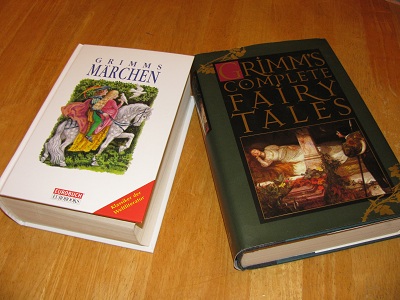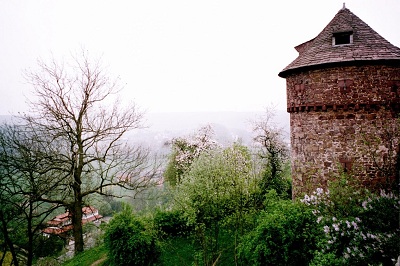It’s Sonderling Sunday! That time of the week when I play with language by looking at the German translation of children’s books, or, in this case, the English translation of German fairy tales. I hope that this post is fun for everyone, whether or not you speak any German.
I’m not sure what took me so long to think of Grimm’s fairy tales. I bought my German edition of this Klassiker der Weltliteratur (classic of world literature) at Sababurg, the castle where the Grimm brothers traditionally set the story of “Sleeping Beauty.” My English edition was given to me by Jeff Conner, the librarian who first hired me to work in a library. It was an excellent choice! So both books mean a lot to me.
I don’t think I’ll go straight through the fairy tales. I’ll start with something more well-known. There are 158 in my German edition, but 211 in my English one. I guess that’s why it calls itself “complete.”
Since I purchased the German edition at Sleeping Beauty’s Castle, why not begin with “Sleeping Beauty,” known in German as Dornröschen (“Briar Rose,” or, more literally, “Little Thorn Rose,” but we’d never call her that!)
Now, my English edition may not be a direct translation of this exact German edition, but it does seem pretty similar, so I have things I can work with.
I like the first sentence of the German edition, with all its alliteration:
Ein König und eine Königin kriegten gar keine Kinder, und hätten so gern eins gehabt.
This translates to: “A king and a queen had absolutely no children, and wanted one very much.”
The English edition puts it more beautifully: “In times past there lived a King and Queen, who said to each other every day of their lives, ‘Would that we had a child!’ and yet they had none.”
In the next part, the English is again wordier, and again I like all those K’s:
Einmal sa? die Königin im Bade, da kroch ein Krebs aus dem Wasser ans Land und sprach:
My translation: “Once when the queen sat in the bath, there crept a toad out of the water onto the land and spoke:”
In the book: “But it happened once that when the Queen was bathing, there came a frog out of the water, and he squatted on the ground, and said to her,”
I’ll continue with cool phrases:
Feen = “wise women” (Google translates it “fairies,” which is what I expected.)
Tugend = “virtue”
Schönheit = “beauty”
was nur auf der Welt herrlich und zu wünschen war = “whatever there is in the world to wish for”
recht zornig (direct translation is “right furious” — doesn’t that sound King James English?) = “burning to revenge herself”
an einer Spindel sich stechen = “prick herself with a spindle” (That one’s better in German…)
und tot hinfallen wird = “and shall fall down dead” (…but this one’s better in English.)
ershraken = “were terrified”
abgeschafft = “burned up” (direct translation: “abolished”)
die Tauben auf dem Dach = “the pigeons on the roof”
die Hunde im Hof = “the dogs in the yard”
die Fliegen an den Wänden = “the flies on the wall”
ja das Feuer, das auf dem Herd flackerte = “the very fire that flickered on the hearth.”
der Braten hörte auf zu brutzeln = “the meat on the spit ceased roasting”
aber sie Hecke nicht hindurchdringen = “but they couldn’t get through the hedge” (My translation)
es war als hielten sich die Dornen fest wie an Händen zusammen = “the thorns held fast together like strong hands”
und sie bleiben darin hängen und kamen jämmerlich um = “and the young men were caught by them, and not being able to get free, there died a lamentable death” (I like jämmerlich for “lamentable” — It makes me think of “Quit your yammering!”)
sie wären aber in den Dornen hängengeblieben und totgestochen worden
My translation: “But they were in the thorns still hanging and stabbed to death.”
In the book: “they had been caught and pierced by the thorns, and had died a miserable death”
Da war der Königssohn so erstaunt über ihre Schönheit, da? er sich bückte und sie kü?te
= “And when he saw her looking so lovely in her sleep, he could not turn away his eyes; and presently he stooped and kissed her”
From that, I especially like:
erstaunt über ihre Schönheit = “astonished over her beauty” (my translation)
er sich bückte und sie kü?te = “he bent and kissed her”
der Braten brutzelte fort = “the spit began to roast”
und der Koch gab dem Küchenjungen eine Ohrfeige = “and the cook gave the scullion a box on the ear”
und die Magd rupfte das Huhn fertig = “and the maid went on plucking the fowl”
And to finish off:
Da wurde die Hochzeit von dem Königssohn mit Dornröschen gefeiert, und sie lebten vergnügt bis an ihr Ende.
= “Then the wedding of the Prince and Rosamond was held with all splendor, and they lived very happily together until their lives’ end.”
How about you? How would you translate some of these phrases into other languages? Any fun ones come up?

